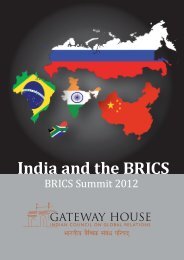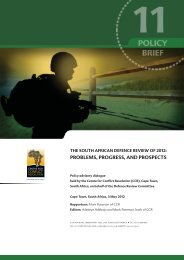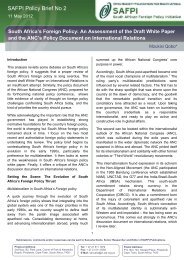Africa quarterly special on emerging powers.pdf - SAFPI
Africa quarterly special on emerging powers.pdf - SAFPI
Africa quarterly special on emerging powers.pdf - SAFPI
- No tags were found...
You also want an ePaper? Increase the reach of your titles
YUMPU automatically turns print PDFs into web optimized ePapers that Google loves.
P A R A D I G M S H I F TFormer U.S. President George W. Bush with a group of dancers in Ghana during his visitto the country in 2008. Photo: the.h<strong>on</strong>oluluadvertiser.commanifold, <str<strong>on</strong>g>Africa</str<strong>on</strong>g>n dictators, often in c<strong>on</strong>nivance with theirpatr<strong>on</strong>s, had also exploited their country’s wealth for theirown aggrandisement. Things have, however, changed for thebetter, with democracy slowly finding a foothold in thec<strong>on</strong>tinent, making it a better place to do business with.Moreover, in earlier times most relati<strong>on</strong>ships between <str<strong>on</strong>g>Africa</str<strong>on</strong>g>and the outside world were bilateral, leading often to a kindof patr<strong>on</strong>-client b<strong>on</strong>d. Today, the instituti<strong>on</strong>al framework fordoing business with <str<strong>on</strong>g>Africa</str<strong>on</strong>g> has improved with the creati<strong>on</strong> ofthe AU as well as several multilateral blocs like the Comm<strong>on</strong>Market for Eastern and Southern <str<strong>on</strong>g>Africa</str<strong>on</strong>g> (COMESA), theEc<strong>on</strong>omic Community of West <str<strong>on</strong>g>Africa</str<strong>on</strong>g>n States (ECOWAS),the East <str<strong>on</strong>g>Africa</str<strong>on</strong>g>n Community (EAC)the Southern <str<strong>on</strong>g>Africa</str<strong>on</strong>g>n DevelopmentCommunity (SADC), to name justa few. Countries are now not <strong>on</strong>lyinterested in bilateral tie-ups but alsoin multilateral instituti<strong>on</strong>al tie-ups.Another trigger has been theexpanding relati<strong>on</strong>s of India andChina with <str<strong>on</strong>g>Africa</str<strong>on</strong>g>n states. Since the1990s, the two <strong>emerging</strong> <strong>powers</strong>have acted as drivers of growth by providing alternativesources of investment, with attractive terms for the <str<strong>on</strong>g>Africa</str<strong>on</strong>g>ns.China, for instance, has offered a kind of ‘triple whammy’ —arms sales, cancelled debts and soft loans. As a result, Chinahas already cornered some of the best oil prospects in Sudanand Angola, the two countries ravaged by civil war from the1970s through the 1990s, and therefore c<strong>on</strong>sidered to be toorisky for oil extracti<strong>on</strong> by the major <strong>powers</strong> [Klare, Volman,2006].The <strong>emerging</strong> <strong>powers</strong> are also revealing <str<strong>on</strong>g>Africa</str<strong>on</strong>g>’s ec<strong>on</strong>omicpotential, because some of the countries have now becomesafer places to invest and trade is increasing between <str<strong>on</strong>g>Africa</str<strong>on</strong>g>nnati<strong>on</strong>s and the new <strong>powers</strong> in <str<strong>on</strong>g>Africa</str<strong>on</strong>g>. The competiti<strong>on</strong> fromToday, the instituti<strong>on</strong>alframework for doingbusiness with <str<strong>on</strong>g>Africa</str<strong>on</strong>g> hasimproved with the creati<strong>on</strong>of the AU as well as theseveral multilateral blocsthese countries has shaken the major<strong>powers</strong> and they are now becomingaggressive in their efforts to outbid the<strong>emerging</strong> nati<strong>on</strong>s and promote their ownec<strong>on</strong>omic interests in <str<strong>on</strong>g>Africa</str<strong>on</strong>g>. In short, theyhave woken up to the fact that <str<strong>on</strong>g>Africa</str<strong>on</strong>g> is nol<strong>on</strong>ger their backyard, where aid could winthem ‘everlasting’ allies, and their <strong>on</strong>ly taskwas to keep these allies in power in orderto get the kind of deals that they wanted.The U.S. and africaSo far as the U.S. is c<strong>on</strong>cerned, itshould be noted that during the Cold Waryears, it had hardly any kind of <str<strong>on</strong>g>special</str<strong>on</strong>g>relati<strong>on</strong>s with any Sub-Saharan <str<strong>on</strong>g>Africa</str<strong>on</strong>g>nstate except for South <str<strong>on</strong>g>Africa</str<strong>on</strong>g>. It did,however, have a patr<strong>on</strong>-client relati<strong>on</strong>shipwith several states, such as Somalia andEthiopia under Emperor Haile Selassie inthe 1970s, in areas where it had geostrategic Cold Warinterests. In fact, it was the East-West rivalry that motivatedmany of its interventi<strong>on</strong>s in <str<strong>on</strong>g>Africa</str<strong>on</strong>g>, for instance, throughproxy forces in Angola [Baptiste, 2005]. Mineral wealth andCold War interests prompted the U.S. to develop a <str<strong>on</strong>g>special</str<strong>on</strong>g>relati<strong>on</strong>ship with South <str<strong>on</strong>g>Africa</str<strong>on</strong>g>. This was, to some degree,resp<strong>on</strong>sible for the perpetuati<strong>on</strong> of apartheid at a time whenmost other countries had no relati<strong>on</strong>s with that country.The fact that <str<strong>on</strong>g>Africa</str<strong>on</strong>g> was of little interest to America isevident from the lack of any high-level visits to that c<strong>on</strong>tinent.Although the U.S. had set up a Bureau of <str<strong>on</strong>g>Africa</str<strong>on</strong>g>n Affairswithin the State Department in 1958, the first state visit by anAmerican president to Sub-Saharan<str<strong>on</strong>g>Africa</str<strong>on</strong>g> was 20 years later in 1978when president Jimmy Cartervisited Nigeria and Liberia. The nextstate visit came 29 years later in 1998,when president Bill Clint<strong>on</strong> paid abrief visit to <str<strong>on</strong>g>Africa</str<strong>on</strong>g>. The year 1998was a turning point because the U.S.embassies in Kenya and Tanzaniawere bombed that year. From 1999,the beginning of some kind of engagement, particularly inpublic diplomacy and trade, can be observed. The same year,the U.S. C<strong>on</strong>gress passed the <str<strong>on</strong>g>Africa</str<strong>on</strong>g>n Growth andOpportunity Act (AGOA) to spur exports to the U.S. from<str<strong>on</strong>g>Africa</str<strong>on</strong>g>. The fact that this Act was passed following thebombing incidents is significant.There was more activity during the presidency of GeorgeW. Bush, who visited the c<strong>on</strong>tinent twice, <strong>on</strong>ce in 2003 andthe sec<strong>on</strong>d time in 2008. There were also attempts atpromoting sustainable development, particularly throughmultilateral fora like G-8 summits and the World Ec<strong>on</strong>omicForum at Davos. The American interest, however, also hada security angle. What is e<str<strong>on</strong>g>special</str<strong>on</strong>g>ly significant is the announce-30August 2011-January 2012





